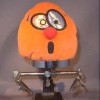
KT
Kevin Toppenberg
Mon, May 20, 2019 1:52 PM
Thanks everyone for the replies.
I realize now that STL's don't have units, and it is the slicer program for
my 3D printer that is interpreting them as mm.
I will consider just scaling my entire object to metric as some have
suggested.
Thanks again.
Kevin T
On Mon, May 20, 2019 at 9:38 AM A. Craig West acraigwest@gmail.com wrote:
I find that it's less of an issue than you might expect. At least in my
use case for imperial units, cut lumber and fasteners mostly, the
dimensions are nominal and not actually that close. A 2x2 board, for
example, is about 1.5 inches by 1.5 inches, with a fairly high variability.
Once you account for that, it's just as easy to just use the metric
dimensions
On Mon, 20 May 2019, 09:14 William Adams, will.adams@frycomm.com wrote:
I was trying to work through this a while back --- wanted to provide a
unit setting in the customizer and it was rather problematic.
On 19.05.2019 18:33, Kevin Toppenberg wrote:
function inch(i) = 25.4*i;
cube([inch(1), inch(1), inch(1)]);
That would probably be better than what I achieved, but the problem was
that in addition to dimensions of the project itself, tooling needed to be
scaled as well.
I'm currently leaving OpenSCAD to the default of millimeters and working
on a front-end for it which will handle units more gracefully.
William
On Sun, May 19, 2019 at 9:17 PM MichaelAtOz oz.at.michael@gmail.com
wrote:
I have been finding, however, that 1 unit in the game world, is
aproximately 1 meter, so I change my scale factor to
this was very helpful, and I'm glad I chose to scale everything.
That may be setting you up or trouble.
You 24"/609.6mm top is the stored as 0.6096, and smaller details, say
screw
hole for draw handle 1/8"/3.175mm is stored as 0.003175.
OpenSCAD gets a bit flaky down in such small number scales, with floating
point conversion losing accuracy.
Admin - email* me if you need anything, or if I've done something
stupid...
- click on my MichaelAtOz label, there is a link to email me.
Unless specifically shown otherwise above, my contribution is in the
Public Domain; to the extent possible under law, I have waived all
copyright and related or neighbouring rights to this work. Obviously
inclusion of works of previous authors is not included in the above.
The TPP is no simple “trade agreement.” Fight it!
http://www.ourfairdeal.org/ time is running out!
Sent from: http://forum.openscad.org/
OpenSCAD mailing list
Discuss@lists.openscad.org
http://lists.openscad.org/mailman/listinfo/discuss_lists.openscad.org
Thanks everyone for the replies.
I realize now that STL's don't have units, and it is the slicer program for
my 3D printer that is interpreting them as mm.
I will consider just scaling my entire object to metric as some have
suggested.
Thanks again.
Kevin T
On Mon, May 20, 2019 at 9:38 AM A. Craig West <acraigwest@gmail.com> wrote:
> I find that it's less of an issue than you might expect. At least in my
> use case for imperial units, cut lumber and fasteners mostly, the
> dimensions are nominal and not actually that close. A 2x2 board, for
> example, is about 1.5 inches by 1.5 inches, with a fairly high variability.
> Once you account for that, it's just as easy to just use the metric
> dimensions
>
> On Mon, 20 May 2019, 09:14 William Adams, <will.adams@frycomm.com> wrote:
>
>> I was trying to work through this a while back --- wanted to provide a
>> unit setting in the customizer and it was rather problematic.
>>
>> On 19.05.2019 18:33, Kevin Toppenberg wrote:
>> > function inch(i) = 25.4*i;
>> > cube([inch(1), inch(1), inch(1)]);
>>
>> That would probably be better than what I achieved, but the problem was
>> that in addition to dimensions of the project itself, tooling needed to be
>> scaled as well.
>>
>> I'm currently leaving OpenSCAD to the default of millimeters and working
>> on a front-end for it which will handle units more gracefully.
>>
>> William
>>
>>
>> On Sun, May 19, 2019 at 9:17 PM MichaelAtOz <oz.at.michael@gmail.com>
>> wrote:
>>
>>> leebc wrote
>>> > I have been finding, however, that 1 unit in the game world, is
>>> > aproximately 1 meter, so I change my scale factor to
>>> inch_to_mm=2.54/100;
>>> > this was very helpful, and I'm glad I chose to scale everything.
>>>
>>> That may be setting you up or trouble.
>>>
>>> You 24"/609.6mm top is the stored as 0.6096, and smaller details, say
>>> screw
>>> hole for draw handle 1/8"/3.175mm is stored as 0.003175.
>>> OpenSCAD gets a bit flaky down in such small number scales, with floating
>>> point conversion losing accuracy.
>>>
>>>
>>>
>>> -----
>>> Admin - email* me if you need anything, or if I've done something
>>> stupid...
>>>
>>> * click on my MichaelAtOz label, there is a link to email me.
>>>
>>> Unless specifically shown otherwise above, my contribution is in the
>>> Public Domain; to the extent possible under law, I have waived all
>>> copyright and related or neighbouring rights to this work. Obviously
>>> inclusion of works of previous authors is not included in the above.
>>>
>>> The TPP is no simple “trade agreement.” Fight it!
>>> http://www.ourfairdeal.org/ time is running out!
>>> --
>>> Sent from: http://forum.openscad.org/
>>>
>>> _______________________________________________
>>> OpenSCAD mailing list
>>> Discuss@lists.openscad.org
>>> http://lists.openscad.org/mailman/listinfo/discuss_lists.openscad.org
>>>
>> _______________________________________________
>> OpenSCAD mailing list
>> Discuss@lists.openscad.org
>> http://lists.openscad.org/mailman/listinfo/discuss_lists.openscad.org
>>
> _______________________________________________
> OpenSCAD mailing list
> Discuss@lists.openscad.org
> http://lists.openscad.org/mailman/listinfo/discuss_lists.openscad.org
>

AC
Alan Cox
Mon, May 20, 2019 2:18 PM
I know that OpenScad doesn't formally have units. But if I make an object:
cube([10,10,10]);
and export it to STL and print it on a 3D printer, it comes out 10x10x10 mm.
That depends entirely on your slicer and printer. Most let you change the
unit to anything you want (within reason).
Alan
On Sun, 19 May 2019 12:33:43 -0400
Kevin Toppenberg <kdtop3@gmail.com> wrote:
> I know that OpenScad doesn't formally have units. But if I make an object:
>
> cube([10,10,10]);
>
> and export it to STL and print it on a 3D printer, it comes out 10x10x10 mm.
That depends entirely on your slicer and printer. Most let you change the
unit to anything you want (within reason).
Alan

FV
Frank van der Hulst
Mon, May 20, 2019 6:43 PM
OpenSCAD gets a bit flaky down in such small number scales, with floating
point conversion losing accuracy.
Double precision (64-bit) floating point has 53 bits (about 16 decimal
digits) in the significand, and loses accuracy when adding a small number
to a large number (or subtracting). However, this loss of accuracy is
essentially independent of the absolute size of the number, at least until
you get down to 10^-292 or so. So, unless you're doing astronomy or
microscopy, multiplying or dividing all numbers by 25.4 won't have any
noticeable effect on accuracy.
Frank
> OpenSCAD gets a bit flaky down in such small number scales, with floating
> point conversion losing accuracy.
>
Double precision (64-bit) floating point has 53 bits (about 16 decimal
digits) in the significand, and loses accuracy when adding a small number
to a large number (or subtracting). However, this loss of accuracy is
essentially independent of the absolute size of the number, at least until
you get down to 10^-292 or so. So, unless you're doing astronomy or
microscopy, multiplying or dividing all numbers by 25.4 won't have any
noticeable effect on accuracy.
Frank

NH
nop head
Mon, May 20, 2019 8:27 PM
The problem is STL uses floats, so when converting from double distinct
points can merge and create degenerate triangles and self intersections.
Also OpenSCAD snaps to a grid coarser than floats and the same problems
happen there.
On Mon, 20 May 2019 at 19:44, Frank van der Hulst drifter.frank@gmail.com
wrote:
OpenSCAD gets a bit flaky down in such small number scales, with floating
point conversion losing accuracy.
Double precision (64-bit) floating point has 53 bits (about 16 decimal
digits) in the significand, and loses accuracy when adding a small number
to a large number (or subtracting). However, this loss of accuracy is
essentially independent of the absolute size of the number, at least until
you get down to 10^-292 or so. So, unless you're doing astronomy or
microscopy, multiplying or dividing all numbers by 25.4 won't have any
noticeable effect on accuracy.
Frank
OpenSCAD mailing list
Discuss@lists.openscad.org
http://lists.openscad.org/mailman/listinfo/discuss_lists.openscad.org
The problem is STL uses floats, so when converting from double distinct
points can merge and create degenerate triangles and self intersections.
Also OpenSCAD snaps to a grid coarser than floats and the same problems
happen there.
On Mon, 20 May 2019 at 19:44, Frank van der Hulst <drifter.frank@gmail.com>
wrote:
>
> OpenSCAD gets a bit flaky down in such small number scales, with floating
>> point conversion losing accuracy.
>>
>
> Double precision (64-bit) floating point has 53 bits (about 16 decimal
> digits) in the significand, and loses accuracy when adding a small number
> to a large number (or subtracting). However, this loss of accuracy is
> essentially independent of the absolute size of the number, at least until
> you get down to 10^-292 or so. So, unless you're doing astronomy or
> microscopy, multiplying or dividing all numbers by 25.4 won't have any
> noticeable effect on accuracy.
>
> Frank
> _______________________________________________
> OpenSCAD mailing list
> Discuss@lists.openscad.org
> http://lists.openscad.org/mailman/listinfo/discuss_lists.openscad.org
>

